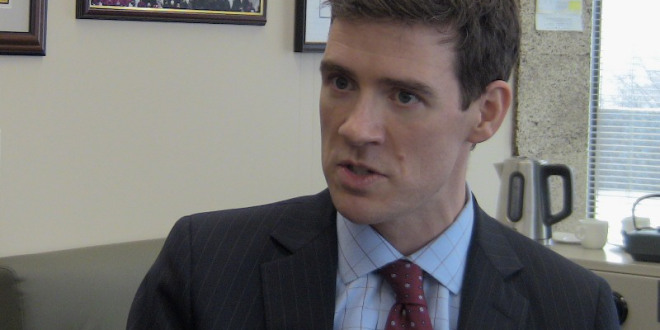Image:

Body:
OTTAWA — Canada’s religious freedom ambassador says he is deeply troubled about the Chinese government’s “egregious” treatment of religious minorities, and that he won’t hold his tongue despite growing trade ties between the two countries.
Since becoming Canada’s inaugural ambassador for religious freedom in February, Andrew Bennett has condemned attacks and restrictions on religious minorities in Egypt, Pakistan, Iran and Syria.
But Bennett pulled no punches on China in an interview Monday, saying he remains very worried about the Chinese government’s “unacceptable” treatment of Falun Gong practitioners as well as Buddhist Tibetans, Uighur Muslims and Christians.
“In the case of China, and in the case of Iran and other countries that really are fairly egregious violators of religious freedom, we will issue frank statements,” he said.
“In engaging on the Chinese question with respect to religious freedom, we will have opportunities, I know, going forward to speak out forcefully on all of these questions of persecution.”
The federal Conservative government unveiled a plan two weeks ago to make trade the top focus of Canada’s diplomatic efforts.
Some have questioned what that means for the promotion of human rights if it bumps up against the Almighty Dollar.
This has already been an issue with China, which has been heavily courted by the prime minister and Conservative government despite its poor record on democracy and human rights, including severe restrictions on religious freedom.
Bennett said Canada has “a mature and multi-faceted relationship” with China, and human rights is always raised whenever a Canadian representative meets with Chinese authorities.
“Whether it’s Minister Baird, whether it’s the prime minister or other government ministers, when they engage the Chinese, they always raise the human rights question,” Bennett said.
“And so I think because we have a mature conversation, I plan to and I will continue to do so, as I have over the last number of months, raise the human rights questions with regards to freedom of religion in China.”
But Bennett also said he has no interest in becoming entangled in any of the territorial disputes that characterize the Chinese government’s relationship with its religious minorities.
Buddhist Tibetans and Uighur Muslims each claim autonomy over a part of China, which is one of the reasons the Chinese government has taken a hard line with those two faiths in the first place.
And Falun Gong practitioners have organized into an international political movement opposed to the current Chinese regime.
Bennett acknowledged the “very complex situation” surrounding both Tibetans and Uighurs, saying that the “question of religious freedom gets very quickly intermixed into various other political questions.”
“My focus is on religious freedom and to speak about why there needs to be recognition of the particular expression of Buddhism that you have in Tibet,” the ambassador said, “of Islam in the Uighur region and also Islam in other parts of China.”
James Miller, an expert on Chinese religions at Queen’s University, agreed that religious freedom and politics are deeply intertwined in China.
But he questioned how Canada could actually promote one and ignore the other.
“By and large, Chinese people are relatively free to engage in their own religious activities provided these are not seen as any kind of threat to the state,” he said.
“The problem is that religion is never just a personal, private or individual activity. It always seems to spill over into the public realm.”
In setting up Bennett’s office, the Conservative government said religious freedom is a requirement for a strong, fertile democracy.
Miller said if it weren’t a political issue, “our government would have no interest in religious freedom.”
“It’s precisely because it becomes a political issue that governments such as Canada have an interest in religious freedom,” he said, “and why governments such as China have an interest in also understanding and monitoring religions.”
Meanwhile, Bennett acknowledged the difficulties in getting a foreign government to listen to Canada’s concerns, not just in China but elsewhere as well.
That’s why the Office of Religious Freedoms’ $5-million annual budget includes more than $4 million to fund programs through third-party organizations in countries such as China that can give the issue traction.
“There are ways in which we can work with countries, some that are going to be very willing to engage with us, others that aren’t so willing to engage with us,” Bennett said.
“Hopefully through (third-party programs), we can work with different communities in those countries to again speak about religious freedom in a way that advances a broader discourse and raises awareness about why religious freedom is such a fundamental right.”
Interested groups and organizations had until mid-November to submit proposals, and the successful ideas are expected to be announced in the coming weeks or months.
Twitter:/leeberthiaume
